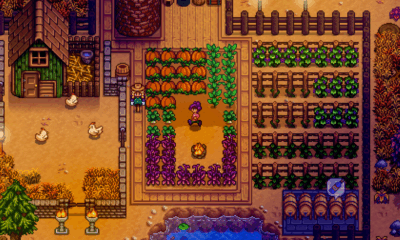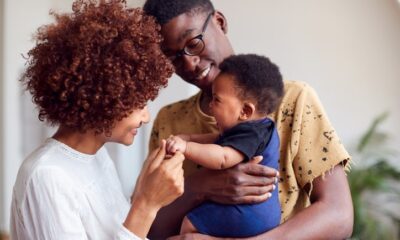Advice
When do babies say their first words? It varies!

Babies make lots of communicative noises, but coos, gurgles, and cries aren’t true speech. When do babies say their first words? Most babies can say at least one or two words by the end of their first year, but the timing may vary considerably from individual to individual.

For instance, experiments indicate that babies understand the meanings of certain words (like “Mommy,” “Daddy”, and the names of a few everyday objects) as early as 6 months. And between 5 and 10 months, most babies have begun babbling in ways that are very speech-like (Morgan and Wren 2018).
Could some of these infants be using speech sounds to communicate — putting together simple syllables (like “ba-ba”) to express a concrete meaning (like “bottle”)?
Maybe. There is evidence supporting the idea that some babies achieve their “first word” milestone at a relatively early age.
Consider, for example, the evidence from parental reports. Rose Schneider and her colleagues surveyed more than 1500 parents, asking them to recall the timing of their babies’ first spoken words. Based on these recollections, up to 75% of babies were speaking their first words by 10 months postpartum (Schneider et al 2015).
And, more recently, researchers completed a more objective, observational study, where trained observers paid monthly visits to the homes of 44 children, beginning when the babies were 6 months old. In this study, researchers recorded several individuals speaking their first words before 10 months of age. The earliest first word was documented at 9 months (Dailey and Bergelson 2023).
So we have reason to think that some babies have begun to produce their first words well before their first birthdays. On the flip side? We also know that many babies take substantially longer than 12 months to utter their first word.
In the survey mentioned above, about 25% of parents said their babies still hadn’t spoken any words by 12 months. In the study where researchers visited children at home, this portion was higher — around 50%. In fact, 7 out of 44 babies weren’t caught speaking their first word until they were 15 months or older (Dailey and Bergelson 2023).
Are babies at risk for problems if they start speaking later? Not necessarily. But if your baby is on the slow side, it’s a good idea to make sure you baby is getting plenty of opportunities to practice language, and to talk with your pediatrician.
Here are the details about when and how babies start talking — and what to look for if you’re concerned about developmental delays.
The emergence of “canonical babbling” — when do babies practice speaking syllables like “ma ma ma“?
From birth, babies make a variety of vocalizations. But it isn’t until months later that babies begin repeating sounds that we recognize as true speech syllables — syllables that include both a consonant and a vowel, like “ma-ma-ma” or “ba-ba-ba” (Oller et al 2001; Oller et al 1998).
When babies blend the consonants and vowels together quickly, the way adult speakers do, it’s called “canonical babbling” (Oller et al 1999). When exactly does this happen? The age of onset varies from individual to individual, and different studies have reported somewhat different trends (Molemans et al 2012).
In some studies, a few babies started canonical babbling before 5 months, and more than half had begun shortly after 7 months (van der Stelt and Koopmans-can Beinum 1986; Fagan 2009). In another study, canonical babbling wasn’t initiated by most infants until after 8 months (Nathani et al 2006).
Overall? Researchers expect most normally-developing babies to begin canonical babbling sometime between 5-6 months and 10 months (Lang et al 2019; Morgan and Wren 2019).
But regardless of when it starts, canonical babbling is a crucial step forward: Babies are practicing the pronunciation of syllables that will become the building blocks of true words.
How do we determine if what we’re hearing is just babbling…or a baby’s first, real word?
It’s tricky. When children are learning to talk, their pronunciation is far from perfect. They do their best to approximate the sounds they hear, and the results might sound like babbling, even though they intend their sounds to function as real words.
For example, what if your baby consistently says “ba-ba” when she’s given a bottle? Maybe she is deliberately and intentionally trying to say “bottle.” If so, that’s a word — albeit an imperfectly pronounced one.
So the question, “when do babies say their first words?” depends not only on the sounds they make, but on whether or not babies have figured out what the sounds are supposed to mean. How early do babies crack the code?
Evidence that even 6-month-old infants can understand certain words
Researchers have designed a clever way to test word comprehension in babies.
First, babies sit on their mothers’ laps while facing an electronic screen. Then a series of images are presented to the babies — images of everyday items. The mothers are blindfolded, so they can’t know what, exactly, their babies can see. But the mothers wear earphones so they can receive instructions from experimenters about what to tell their babies.
With each trial, multiple items appear simultaneously at different locations on the screen. And the mothers are told to say something — to repeat back a phrase or question that singles out one object by name.
For instance, if the screen displays two items — a mouth on the left and an apple on the right — the mother might be told to say, “Do you see the mouth?”


How do babies react?
Researchers testing English-speaking families have consistently found that babies as young as 6 months tend to look longer at the items their mothers speak about.
For the youngest infants in these studies, the difference is subtle. But it’s there, and it suggests that babies have started to connect the sounds of certain words with their meanings.
In particular, babies have shown signs of understanding the names of parents (e.g., “Mama” and “Daddy”), as well words that refer body parts and food (Tinkoff and Jusczyk 1999; Tinkoff and Jusczyk 2012; Bergelson and Swingley 2012; Bergelson and Swingley 2015; Bergelson and Aslin 2017).
Now, keep in mind: The results of these comprehension experiments may depend on contextual factors.
Babies showed signs of understanding when the words were spoken by their own mothers. But what if they listen to other people? When babies have been tested with unfamiliar voices, they don’t always show the same evidence of word comprehension (Steil et al 2021).
It’s also possible that some languages are harder than others for babies decipher. In one experiment, babies learning Norwegian didn’t show preferential looking until they were 8-9 months old, possibly because Norwegian is a more phonologically complex language than English (Kartushina and Mayor 2019).
Moreover, as you might expect, it depends a lot on which words you test. Babies are more likely to have learned the meaning of words that their parents have used in conversation with them every day. And some situations may be especially conducive to learning.
For instance, during meal times, caregivers typically interact with their babies face to face, and they may repeat certain key words (like the names of utensils and food items) at just the right moment — when babies are looking at the objects being named (Clerkin and Smith 2019). This makes it easier for babies to figure out what parents are trying to communicate.
So if your baby seems to understand what the word “bottle” means, and says something like “ba-ba” to request his bottle, it’s not unreasonable to think he’s making use of a word. Reports of very early word use aren’t common, but they exist. For instance, in a study tracking 46 babies over time, 6 individuals were reported by their English-speaking parents to be producing a word by the age of 7 months (Moore et al 2019).
And even if your baby doesn’t turn out to be an early talker, it’s worthwhile to be open to the idea that your baby is ready to produce language.
That’s because language skills grow when adults engage babies in conversation. (Endevelt-Shapira et al 2024; Frank et al 2021; Ferjan Ramírez et al 2020; Ferjan Ramírez et al 2019; Newman et al 2016; Shneidman and Goldin-Meadow 2012).
In fact, when parents have been coached to provide this kind of interactive stimulation (talking face-to-face, and taking turns to communicate), babies have showed steady gains over the following year — developing more advanced expressive language skills relative to children in a control group (Huber et al 2023).
So I think it’s valuable to treat babies as conversation partners, and embrace the possibility that their language skills will benefit. If we take the stance that our infants might be capable of using words earlier in life, it will encourage us to provide our babies with the rich, interactive language they need to develop larger, productive vocabularies.
But what if your baby isn’t speaking yet? When should you worry?
Researchers emphasize that it’s normal for babies to vary quite a bit in the timing of their speech milestones. As noted above, many babies haven’t spoken their first words by the age of 12 months. But there are guidelines for identifying children that seem to be developing more slowly than normal.
Late onset of canonical babbling
In typically-developing children, canonical babbling emerges by 10 months. Babies who don’t show signs of canonical babbling by the end of this period may be at risk for future language problems (Lang et al 2019; Lomander et al 2017). So if you aren’t hearing those syllables by 9 months, this is something you’ll want to monitor.
Talk to your pediatrician about your concerns, and take advantage of opportunities to help your baby learn. This includes engaging in your baby in conversation (as mentioned above). It also includes encouraging your baby’s efforts to babble by imitating the speech-like sounds your baby makes (Goldstein and Schwade 2008).
Lack of eye contact and / or difficulties with social interation
Language delays are sometimes an early sign that a child will develop autism spectrum disorder (ASD), so you’ll want to watch out for other potential signs. Newborn babies who later develop autism often show a normal interest in making eye contact with their caregivers. But, between 2 and 6 months postpartum, these babies begin to pay less attention to eyes (Jones and Klin 2014; Schultz et al 2018), and they show less interest in social interactions (Shen and Piven 2017).
No words by 13 months
Throughout the world, infants are typically speaking their first words by 11-13 months, and research suggests that most babies show major improvements in their ability to understand speech by 14 months (Bergelson and Swingley 2012). So if your baby is approaching 14 months and still hasn’t spoken any words, it’s a good idea to consult with your pediatrician for advice.
Timely intervention can get children back on track
When a child’s language development lags behind, that doesn’t always mean that something is wrong. But if there is an underlying problem, it’s best to identify it early in development. Modern speech therapists have developed interventions for children with speech delays (Law et al 2003), and the earlier children begin, the sooner children can make progress.
Ways to support language development
Babies need our help learning language. Like adults who learn to speak a foreign language, babies benefit from being included in conversation. They also benefit when we pay attention to their curiosity, and use evocative gestures as we speak to them. Read more about these tactics, and other evidence-based ways to help your baby learn in my article, “How to support language development in babies”.
More information
For more in-depth information about the power of one-on-one communication in teaching children to understand and speak words, see this article.
References: When do babies say their first words?
Bergelson E and Swingley D. 2018. Young Infants’ Word Comprehension Given An Unfamiliar Talker or Altered Pronunciations. Child Dev. 89(5):1567-1576.
Bergelson E and Swingley D. 2015. Early Word Comprehension in Infants: Replication and Extension. Lang Learn Dev. 11(4):369-380.
Bergelson E and Swingley D. 2012. At 6-9 months, human infants know the meanings of many common nouns. Proc Natl Acad Sci U S A. 109(9):3253-8
Bergelson E and Aslin RN. 2017. Nature and origins of the lexicon in 6-mo-olds. Proc Natl Acad Sci U S A. 114(49):12916-12921.
Bradshaw J, McCracken C, Pileggi M, Brane N, Delehanty A, Day T, Federico A, Klaiman C, Saulnier C, Klin A, Wetherby A. 2021. Early social communication development in infants
-

 Destination8 months ago
Destination8 months agoSingapore Airlines CEO set to join board of Air India, BA News, BA
-

 Breaking News10 months ago
Breaking News10 months agoCroatia to reintroduce compulsory military draft as regional tensions soar
-

 Gadgets3 months ago
Gadgets3 months agoSupernatural Season 16 Revival News, Cast, Plot and Release Date
-

 Tech News12 months ago
Tech News12 months agoBangladeshi police agents accused of selling citizens’ personal information on Telegram
-

 Productivity11 months ago
Productivity11 months agoHow Your Contact Center Can Become A Customer Engagement Center
-

 Gadgets3 weeks ago
Gadgets3 weeks agoFallout Season 2 Potential Release Date, Cast, Plot and News
-

 Breaking News10 months ago
Breaking News10 months agoBangladesh crisis: Refaat Ahmed sworn in as Bangladesh’s new chief justice
-

 Toys12 months ago
Toys12 months ago15 of the Best Trike & Tricycles Mums Recommend























